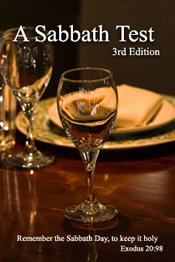


Introduction
Who Decides How God is Worshipped?
O Lord, I know that the way of man is not in himself:
it is not in man that walks to direct his own steps
Jeremiah 10:23
Several years ago a longstanding member of a major Protestant denomination began questioning some of the traditions of his church. Most notable among these traditions were the festivals and holy days taught by his pastor and embraced by his denomination his entire life.
As a child growing up, this man believed in these traditions. He loved Christmas with all its decorations and presents. He anticipated Easter with its candy and games. They were such great days. What was not to like?
Later, as a young adult, this devout man tried to see meaning and significance in these seasons, but eventually the things he had long thought to be true began to look less true. Oh, to be sure, Jesus’ birth is described in the Bible, but noticeably absent is any evidence of this event being celebrated by the apostles or the early New Testament church. And although Jesus’ resurrection consumes a significant portion of the gospels, the early church kept the Passover, not Easter. Even a casual study of these holidays revealed that their origin came not from the scriptures but rather from ancient Pagan festivals dedicated to honoring an endless array of deities, but never the God of the Bible.
The young man’s study would then take him to the Sabbath, and once again, another longstanding practice of the church seemed to directly contradict the Bible. As he continued to research this subject, he would discover that Jesus and His apostles as well as the first century Christians kept the seventh day (Saturday), not Sunday as he had been taught.
Overwhelmed by this new understanding, the young man approached his pastor for answers. However, instead of answers, all he seemed to get were excuses. His pastor argued that it doesn’t really matter which day a Christian observes because “God looks on the heart.” He then explained that Sunday worship and holidays such as Good Friday, Palm Sunday, Ash Wednesday, and Lent actually enhance the meaning of the “faith” and point believers to a deeper understanding of the gospel. Therefore, God couldn’t possibly be opposed to such traditions.
As this meeting progressed, the young man’s pastor vigorously defended each of the festivals kept by the church. At one point, he even argued that the world as we know it today, with all its complexities, made it impossible to keep the Sabbath as described in the Bible. He then argued that Christmas was a wonderful holiday because of its impact on children, while Easter was equally beautiful because it was a means to evangelize to unbelievers about a risen Christ. During this meeting, this pastor actually suggested that the holy days kept by Jesus and His disciples were legalistic and burdensome and those who keep them today are simply being self-righteous.
When the young man indicated that not one argument advanced by his pastor could be supported by scripture, his pastor became furious. He accused the young man of being pharisaical and intolerant. At one point, he even called him a “Judaizer.” He then suggested that the young man look into his heart for answers. But never once did he encourage him to look into God’s word for the truth.
One Last Question
As the young man began to leave his pastor’s office he paused and then asked this man he had trusted for so many years one last question. “Sir,” he said, “Does the Bible anywhere remotely hint that man has the authority to decide for himself how he may worship his Creator?”
There is a profound quality and strength to this question because it cuts to the very core of the faith proclaimed in the pages of your Bible. It is a question that should be on the lips of every true believer. Tragically, however, it is not.
Mankind down through the ages has always attempted to worship God on his own terms. As a result he has crafted an endless array of faiths, all claiming to serve some higher power. Even within Christianity there are virtually hundreds of denominations with radically different beliefs. However, each of these denominations asserts that it is a “Bible believing church.” How is this possible?
A Question Answered
Although the young man’s pastor never answered his last question, the Bible most certainly does. The scriptures declare with great force that man does NOT have the moral authority to decide for himself how he will worship the Great Creator of Heaven and Earth. God alone has this authority. Furthermore, both the Old and New Testaments warn against thinking otherwise
A Stern Warning
When speaking to the children of Israel, God once warned them to not inquire about other religions and to never attempt integrating those religions into the truth He was giving them (Dt. 12:30-31). He then expressed a powerful principle regarding how He is to be worshiped.
Whatsoever thing I command you, observe to do it: you shall not add thereto nor diminish from it. (Dt. 12:32)
Here God is stating that true faith is defined by Him, not by man. God alone has the moral authority to determine how He is to be worshiped. Furthermore, God commanded Israel to follow each of His instructions precisely as they were given. They were not to add to it or take anything away from it in any way, shape or form. Tragically, this is a principle that the ancient nation of Israel repeatedly ignored. The Bible is a chronicle of this defiance. Consider just two examples.
Example I
When Moses was on Mount Sinai receiving the Ten Commandments, the Israelites were demanding that Aaron fashion a golden calf so that they could have an idol to lead them (Ex. 32:1). Once this idol was crafted, Aaron had the audacity to proclaim it as a gift to the very God who had delivered these slaves out of bondage. With the idol in plain view of this newly emancipated people, Aaron declared “a feast to the Eternal.”
And when Aaron saw it, he built an altar before it; and Aaron made proclamation, and said, Tomorrow is a feast to the Lord. (Ex. 32:5)
Imagine the scope of this act. While God Himself was commanding Moses to refrain from making any graven images (the second commandment), Aaron was fashioning a golden calf for God’s people to worship! When God saw this attempt to build a faith using the traditions of Egypt, He was furious and even threatened to extinguish the Israelites for such defiance (Ex. 32:7-10).
Example II
Later, when Israel was a young monarchy under King Saul, God, through his prophet Samuel, gave them very specific instructions concerning how to prosecute a war with the Amalekites (1Sa.15:2-3). However, as the war progressed, Saul made some modifications to these instructions (verse 9).
When the battle was over, Samuel came to the king and asked why he hadn’t followed God’s word concerning the war they had just won (verses 10-14). Saul responded by explaining that he thought his approach would enhance Israel’s worship of the Eternal (verse 15). Imagine a man, even a king, actually thinking he knew better than God about worship. But that is exactly what Saul argued.
These are just two of many Old Testament examples where God’s children tried to “do Him one better” when it came to defining the faith. Regrettably, such examples of defiance are not limited to the ancient nation of Israel. The New Testament also describes several examples of God’s people thinking they could somehow decide for themselves how to worship the God of Abraham, Isaac, and Jacob.
In Vain Do They Worship Me
The gospels of Matthew and Mark record an event in which Jesus was chastised by the religious leaders of His day because His disciples “transgressed the tradition of the elders” (Mt. 15:1-2, Mk. 7:1-5). Jesus responded to this accusation by rebuking these “pious” men because they held their traditions as having greater moral weight than God’s law. Notice what He said:
“...Well hath Isaiah prophesied of you hypocrites, as it is written, This people honors Me with their lips, but their heart is far from Me. Howbeit in vain do they worship Me, teaching for doctrines the commandments of men. For laying aside the commandment of God, ye hold the tradition of men, as the washing of pots and cups: and many other such like things ye do.” And he said unto them, “Full well ye reject the commandment of God, that ye may keep your own tradition.” (Mk. 7:6-9)
A History of Defiance
Clearly, the story of mankind is a story of defiance. It is a story of man thinking that he can decide for himself how he will serve the God who made him. The danger of such arrogance is staggering and even threatens those who consider themselves true believers. Notice the sober warning Jesus gave concerning some who thought they could worship God on their terms.
Not every one that saith unto me, Lord, Lord, shall enter into the kingdom of heaven; but he that doeth the will of My Father which is in heaven. Many will say to Me in that day, Lord, Lord, have we not prophesied in Thy name? And in Thy name cast out devils? And in Thy name done many wonderful works? And then will I profess unto them, I never knew you: depart from Me, you that work iniquity. (Mt 7:21-23)
Here, the Messiah declares with great force that simply confessing “Jesus is Lord” is not enough. God requires action. The faith of His people must be a living faith (Jas. 2:20) – one that demonstrates a total commitment to the Great God of Heaven. Such a commitment is reflected in obedience to Him and His law.
With this in mind, the big question facing God’s people today is powerfully linked to the warning Jesus uttered when giving the Sermon on the Mount.
Are you obeying the God of Heaven - or have you been captured by the traditions of men?

